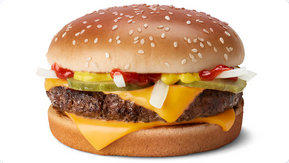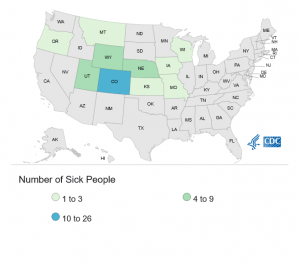Deadly E. coli outbreak linked to McDonald’s Quarter Pounders sickens 49 people in 10 states
October 23rd, 2024 by Ric Hanson
(Atlanta, GA) – Officials with the Centers for Disease Control and Prevention (CDC) said Tuesday (Oct. 22nd), that E. coli food poisoning linked to McDonald’s Quarter Pounder hamburgers has sickened at least 49 people in 10 states, including one person who died and 10 who were hospitalized, federal health officials said Tuesday. The death was reported in an older person in Colorado, and one child has been hospitalized with severe kidney complications. 
Infections were reported between Sept. 27 and Oct. 11, in Colorado, Iowa, Kansas, Missouri, Montana, Nebraska, Oregon, Utah, Wisconsin and Wyoming. Colorado has the most cases, 27, followed by Nebraska with nine.  Everyone interviewed in connection with the outbreak had reported eating at McDonald’s before falling ill and most mentioned eating Quarter Pounder hamburgers, the CDC said. The U.S. Agriculture Department, the Food and Drug Administration and state health officials are also investigating.
Everyone interviewed in connection with the outbreak had reported eating at McDonald’s before falling ill and most mentioned eating Quarter Pounder hamburgers, the CDC said. The U.S. Agriculture Department, the Food and Drug Administration and state health officials are also investigating.
The specific ingredient tied to the outbreak has not been identified, but investigators are focused on onions and beef. McDonald’s reported to the CDC that it had removed slivered onions and beef patties used for Quarter Pounders from stores in the affected states. The burgers may be temporarily unavailable in those states.
E. coli bacteria infections can cause severe illness, including fever, stomach cramps and bloody diarrhea. People who develop symptoms of E. coli poisoning should seek health care immediately and tell the provider what they ate. Symptoms of E. coli start 3 to 4 days after ingesting the bacteria. Most people recover without treatment after 5 to 7 days.
The type of bacteria implicated in this outbreak, E. coli O157:H7, causes about 74,000 infections in the U.S. each year, leading to more than 2,000 hospitalizations and 61 deaths. Infections are especially dangerous for children younger than 5 and can cause acute kidney failure.




